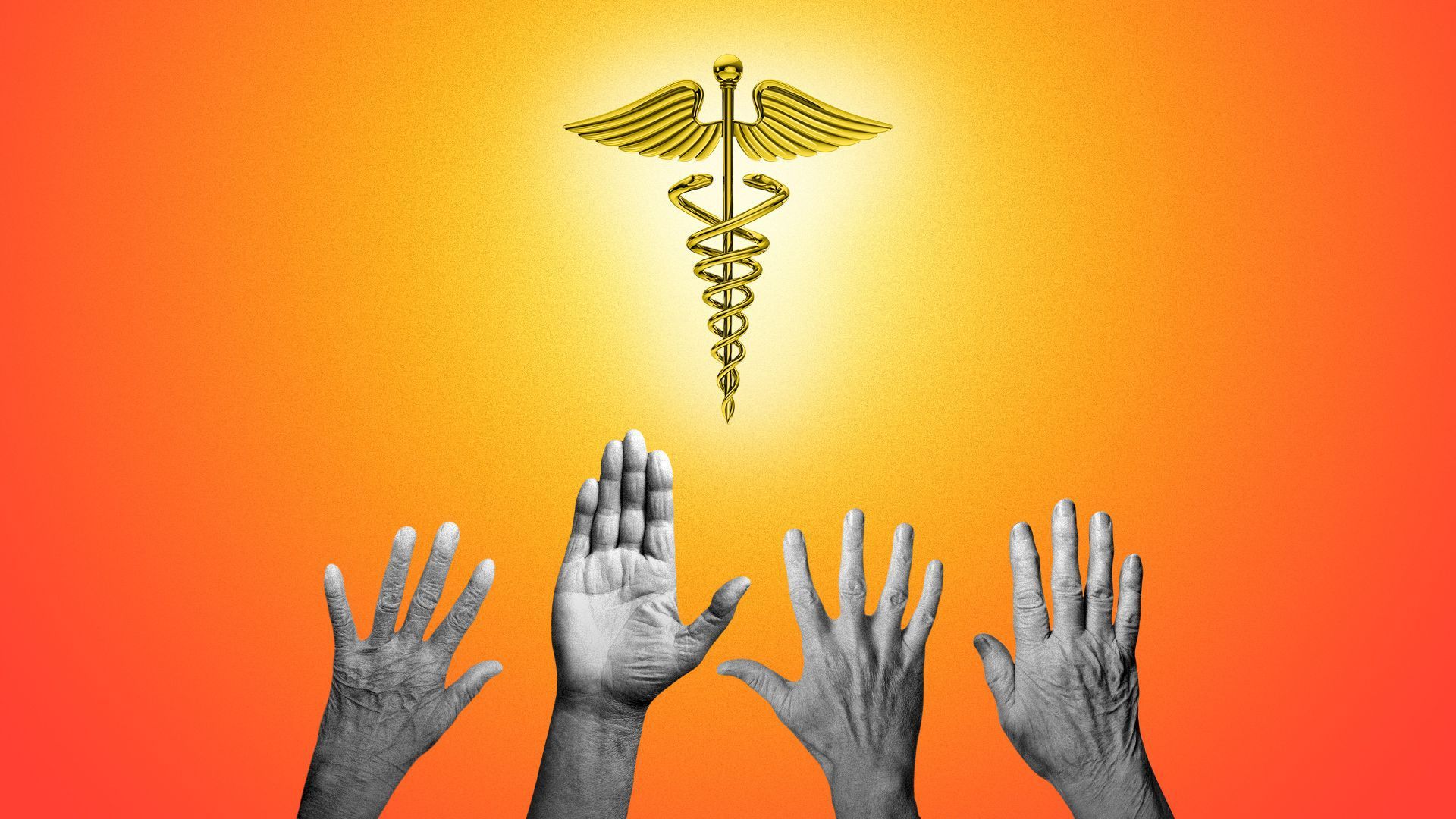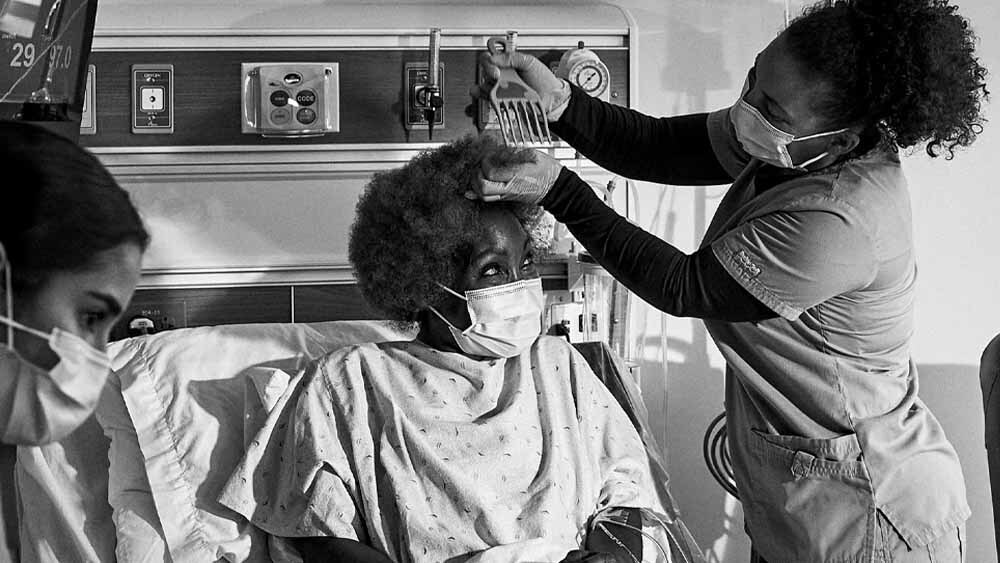| |
| |
| |
| Presented By HCA Healthcare |
| |
| Axios Vitals |
| By Tina Reed ·Jan 18, 2022 |
| Good morning, Vitals readers. Today's newsletter is 874 words or a 3-minute read. 💰 Situational awareness: It's earnings season again, y'all. UnitedHealth Group is kicking off the slew of Q4 and year-end financial results releases tomorrow. |
| |
| |
| 1 big thing: Transplants rebound from COVID lull |
 More than 41,000 Americans underwent an organ transplant in 2021, a new record and a 6% increase from 2020, when the pandemic caused a slight slowdown of the life-saving procedures, Axios' Bob Herman writes. Why it matters: There are more transplant patients than ever, and they are particularly vulnerable to the worst effects of COVID because of their compromised immune systems — although vaccines provide important protection. The state of play: Death rates among transplant patients who get COVID and need to be hospitalized are "very high," according to several studies — especially for lung transplant recipients. - However, older age and chronic health conditions also put transplant patients at higher risk, just like they do for people who haven't gotten a transplant.
The big picture: Taking immunosuppressive drugs often reduces how effective vaccines can be, but studies in the U.S. and the U.K. show COVID vaccines drastically lower the risk of hospitalization and death for transplant patients compared with the unvaccinated. Yes, but: Vaccinated transplant patients are still significantly more likely to get infected, become hospitalized or die from COVID than vaccinated people with fully functioning immune systems. - That's why the CDC recommends the immunocompromised get "three mRNA doses and a booster."
- Transplant centers like the University of California San Francisco also want vaccinated transplant patients to "assume that you are not protected against severe disease after vaccination" and continue "wearing a mask, social distancing and encouraging your family and household members to get vaccinated."
The bottom line: "The risk of severe disease will always be higher in immunosuppressed patients, even if [COVID] becomes milder with Omicron," said Deepali Kumar, a transplant physician in Toronto and president-elect of the American Society of Transplantation. But "the unvaccinated remain at a huge disadvantage." Share this story. |
    |
| |
| |
| 2. Pediatric vaccinations stall in rural areas |
 Note: Data is not shown for states in which the county was unknown for at least 10% of the children vaccinated in that state, or where children vaccination data was unavailable; Reproduced from a KHN analysis of CDC and NCHS data: Chart: Axios Visuals Children's vaccination rates remain stubbornly low in the U.S., particularly in rural parts of the country. Rates also vary drastically by state, Axios' Caitlin Owens writes from KHN data. Why it matters: Children rarely get severe COVID cases, but it happens. Vaccinations are also a crucial tool for keeping schools open as Omicron rips through the country, experts say. - Only 18% of children ages 5–11 are fully vaccinated, per the CDC, and 28% have received at least one dose. More than half of children 12–17 — who have been eligible for the shots significantly longer — are fully vaccinated.
|
    |
| |
| |
| 3. Agencies to examine birth control coverage |
| Health insurers could face increased scrutiny and potential enforcement actions regarding their coverage of birth control, following recent guidance from the Biden administration. Why it matters: The ACA requires birth control coverage with no cost-sharing, but some advocates and Democrats in Congress have said insurers are running afoul of the law with restrictions. Details: The Departments of Labor, Health and Human Services, and the Treasury released a jointly prepared FAQ in response. - "The Departments are actively investigating these complaints and reports and may take enforcement or other corrective actions," the document read.
What they're saying: "It's the law: patients are supposed to have coverage for the birth control that works best for them — without paying extra and without jumping through unnecessary hoops," said Sen. Patty Murray, D-Wash. - "This is a good step from the Biden-Harris Administration to show insurers they need to do what they're supposed to and I'm going to stay focused on this until it's fixed," said Murray, who is the chairwoman of the Health, Education, Labor, and Pensions Committee.
The other side: Insurers have said they're following the law by covering at least one form of contraception in each of the 18 contraception categories defined by the FDA. |
    |
| |
| |
| A message from HCA Healthcare |
| HCA Healthcare's $10 million commitment to advancing diversity |
| |
 |
| |
| In 2021, HCA Healthcare announced it will give $10 million to Historically Black Colleges and Universities and Hispanic-Serving Institutions. This investment will help advance diversity in healthcare by creating a more diverse talent pipeline reflective of HCA Healthcare's communities. |
| |
| |
| 4. Big jump in Medicare Advantage enrollment |
 |
|
| Illustration: Aïda Amer/Axios |
| |
| More than 28.5 million seniors and people with disabilities were enrolled in a private Medicare Advantage plan as of Jan. 1, an 8.8% increase from the same time in 2021, Bob writes about new federal data. Why it matters: Enrollment in the controversial MA program continues to grow, and based on prior full-year trends, enrollment in 2022 likely will surpass the federal government's prediction of 29.5 million people. |
    |
| |
| |
| 5. Pic du jour: COVID dominates Davos |
 |
|
| Photo: Fabrice Coffrini/AFP via Getty Images |
| |
| COVID was a dominant theme at the World Economic Forum in the second year it has been held virtually due to fears of the spread of the virus. Driving the news: NIAID director Anthony Fauci, bottom left, spoke remotely during the event Monday, saying Omicron's role in potentially ending the pandemic is still an open question, CNBC reported. - "It is an open question whether it will be the live virus vaccination that everyone is hoping for," Fauci said via videoconference at The Davos Agenda virtual event, per CNBC.
|
    |
| |
| |
| 6. While you were weekending |
 |
|
| Illustration: Aïda Amer/Axios |
| |
- The CDC has been under fire for some key messaging mistakes throughout the pandemic, and this analysis from Apoorva Mandavilli offers some clarity on the problem. (New York Times)
- Speaking of which ... the Wall Street Journal got an exclusive interview with CDC director Rochelle Walensky, who acknowledged she hasn't been clear enough with the American public. (Wall Street Journal)
- Unilever — which owns the Dove soap brand — is trying to acquire GSK's consumer healthcare products arm which includes Sensodyne toothpaste and Advil painkillers. So far, GSK says no dice. (Reuters)
- And ... this story offers a tangible look at the downstream consequences of Michigan's new auto no-fault law on those who are catastrophically injured — and the health system. (Michigan Radio)
|
    |
| |
| |
| A message from HCA Healthcare |
| HCA Healthcare strategically partners with leading tech companies |
| |
 |
| |
| HCA Healthcare, a leading provider of healthcare services with over 32 million annual patient encounters, has partnered with General Electric, Google and other technology companies. These partnerships help build innovative solutions to advance care delivery in and outside of its hospitals. |
| |
| 🚀 Thanks for starting your week with us. A reminder your family, friends and colleagues can subscribe to Vitals or any of Axios' other free local and national newsletters through this link. |
 | Bring the strength of Smart Brevity® to your team — more effective communications, powered by Axios HQ. | | |









No comments:
Post a Comment